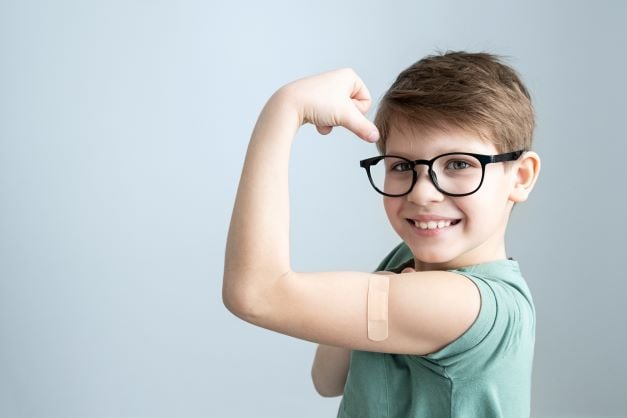
A first-of-its-kind national study looking at the optimal COVID-19 vaccination strategies for children and adolescents is set to begin at Perth’s The Kids Research Institute Australia thanks to a $3.8 million funding injection from the Australian Government’s Medical Research Future Fund (MRFF).
Stage 2 of the Platform Trial In COVID-19 Vaccine priming and BOOsting (PICOBOO) will investigate which ‘priming’ and booster vaccination strategies provide the best protection against COVID-19 in kids and will intitially recruit children aged 6 to 17 years at four sites across Australia.
Led by Dr Charlie McLeod, Deputy Director of the Wesfarmers Centre of Vaccines and Infectious Diseases, based at The Kids Research Institute Australia, and Infectious Diseases Paediatrician at Perth Children’s Hospital, the results generated in stage 2 of the PICOBOO Study are expected to inform national and potentially global COVID-19 immunisation practice and policy in kids in the future.
Commencing immediately with the adolescent age group, this research will build on the knowledge gained from the initial MRFF-funded PICOBOO research focusing on adults that launched at the Institute earlier this year.
“Throughout stage 1 we have been investigating the impact of COVID-19 vaccinations on the immune system in adults, including whether ‘mixed’ vaccine schedules offer better protection compared to schedules comprising the same COVID-19 vaccine, and how the impact of varying strategies differs according to age group and previously administered Covid-19 vaccines,” said Dr McLeod.
“The current Australian Technical Advisory Group on Immunisation (ATAGI) recommendation for children 5 – 15 years of age is to undergo the initial 2-dose ‘primary’ COVID-19 vaccine schedule, whereas adults have now been given at least three or four COVID-19 vaccine doses in total to ‘boost’ their protection against disease.
“Extending the existing PICOBOO platform to include children will be the first time we are able to gain insights into the impacts of COVID-19 vaccination on the immune system in children, which will help us determine whether booster vaccination is warranted and, if so, how often this should be recommended.
“We are also hoping this research will reveal if a past COVID-19 infection provides a similar level of natural immunity against the virus as vaccination, or if an annual booster will be required for kids, just like the flu vaccine.
“This work will be instrumental in answering these critical questions and ensuring we have the best possible COVID-19 vaccination strategies for children going forward, as well as providing ongoing surveillance as additional variants and sub-variants emerge and new vaccines become available for use in Australia,” said Dr McLeod.
PICOBOO Stage 2 includes collaborators from The Kids Research Institute Australia, The University of Western Australia, Perth Children’s Hospital, The University of Sydney, The University of Melbourne, The University of Adelaide, Launceston General Hospital, RMIT University, Melbourne Health and The Royal Children’s Hospital (Melbourne).
The recruitment team will be looking for 300 teenagers aged 12 – 17 years and 150 children aged 6 – 11 years to receive a COVID-19 booster vaccination and participate in follow-up study appointments to measure the body’s immune response over a 12-month period.
Parents who would like to register their children can email Vax4COVID@thekids.org.au or call the Vaccine Trials Group at the Wesfarmers Centre of Vaccines and Infectious Diseases on 0400 450 240.
Adults interested in participating in the initial stage of PICOBOO are also encouraged to contact the study team, with researchers currently looking for:
- adults aged 70+ who have received two doses of Astra Zeneca as their primary schedule and want to receive their 2nd booster.
- adults aged 50 – 69 who have received two doses of Pfizer as their primary schedule and want to receive their 2nd booster.
- adults aged 18 – 50 who have two doses of Pfizer as their primary schedule and want to receive their 2nd booster.
